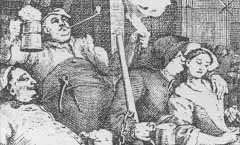
The Pub in Literature: England's Altered State,
by Steven Earnshaw
 |
SCENE AN INN? AND HORRIBLE GIN
|
An author ought to consider himself, not as a gentleman who gives a private or eleemosynary treat, but rather as one who keeps a public ordinary, at which all persons are welcome for their money. Henry Fielding's introduction to Tom Jones.
This page deals mainly with eighteenth-century material (click on any of the green-highlighted words to be whisked there). The eighteenth century - 'the age of conviviality' - saw a great rise in the consumption of gin, mainly amongst the 'lower classes'. The production of the drink had initially been encouraged to make use of surplus corn, but gin-drinking became a major social problem up until the 1750s, when legislation that limited its sale and an inflation of its price helped allay its worst effects. Its popularity bespeaks a harsh environment from which gin provided a quick and easy escape route. The gin of the eighteenth century would have had a sickly sweet taste (hence 'dry' gin is these days distinguised from it). Hogarth's 'Gin Lane' and its companion piece 'Beer Street' were the most famous interventions in the anti-gin propaganda. Fielding's An Enquiry into the Causes of the Late Increase in Robbers also played its part. In Oliver Goldsmith's She Stoops to Conquer (1773) there is a motif of mistaking a house (mansion) for an inn. The conceit rests on the decline in fortunes of certain parts of the upper classes, a fear that their estates will (have!) descend into mere hostelries. (Under construction) Henry Fielding is best known for his novels Tom Jones and Joseph Andrews, to texts which abound with inns and alehouses. These are the works which are responsible for our image of that time as good-natured, robust and risque. But in Enquiry and Journal of a Voyage to Lisbon we see a different picture of England. In the former we see the 'mechanic' part of the nation prey to the evils of 'luxury', spending their extra 'wealth' on drink. For Fielding, drunkenness arising out of gin-drinking is of a different type from that of less-strong liquors, and so 'drunkenness' is not in itself at fault (as it would be in the nineteenth century). And in the Journal a quarter of the text is taken with his description of his time spent at Mrs Humphrey's 'inn' as he waits for his ship to depart. He uses the period to discourse on the condition of England. |